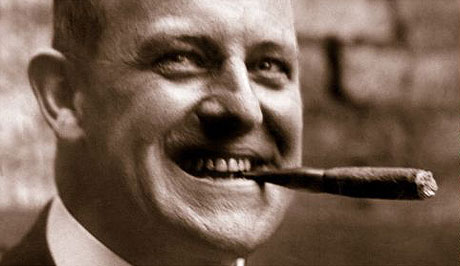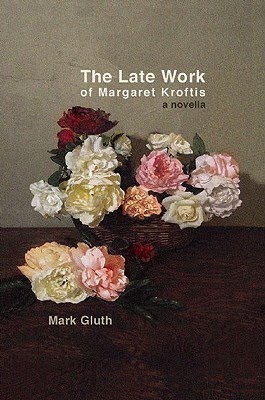Opium’s death matches have a refreshing spirit, but I don’t understand this. Are we that competitive?
I’m not sure how to say this, but the new Joanna Newsom album is going to be three CDs/LPs. You can find the first single on the Drag City homepage. It is, um, gorgeous. I feel like most people here probably hate Joanna Newsom. What do you think of Joanna Newsom?
Go Jeeves! Go Life!

P.G. Wodehouse
“I just read in this morning’s paper that [P.G.] Wodehouse says that they give him $104,000 for doing nothing at Hollywood they keep him there but they do not use what they ask him to do.”
— Gertrude Stein, from a letter to playwright Thorthon Wilder (1936)
—
“It is a good rule in life never to apologize. The right sort of people do not want apologies, and the wrong sort take a mean advantage of them.”
— P.G. Wodehouse
“Have your own fun.”
 Finally having got a hold of the beautiful latest issue of Fence, I was struck–[before being struck by the words of the pieces, as usual, and by their new colored layout on the page in this issue in a combo of blue/black/gray that I wish more publications would take on]–in reading Rebecca Wolff’s editor’s note. The note concerns itself mainly with an email that she received about an announcement for Brandon Downing’s brand new, and by and large tough to nail down, Lake Antiquity.
Finally having got a hold of the beautiful latest issue of Fence, I was struck–[before being struck by the words of the pieces, as usual, and by their new colored layout on the page in this issue in a combo of blue/black/gray that I wish more publications would take on]–in reading Rebecca Wolff’s editor’s note. The note concerns itself mainly with an email that she received about an announcement for Brandon Downing’s brand new, and by and large tough to nail down, Lake Antiquity.
The emailer was bitching at Ms. Wolff for calling the book ‘indescribable’ and then simultaneously going on to try to describe it. The emailer apparently thought the book wasn’t as indescribable as she thought it was, and gave his take on how she should have described it. Bitching at her for being in awe of something, and not knowing exactly how to say why. She responds and then takes the consideration of the person’s email as a chance to open up the consideration of her editorial stance, which struck me as so right and crucial that I am going to copy the heart of it right here:
As a publisher, I often find myself in the position of ushering texts into the world that are, frankly, over my head in terms of their erudition or the richness of the literary-historical medium in which they grew–most of the poets I publish have read more than I have, and my appreciation of their work is made up of some combination of savvy (“this work is smart, and, in its position in the literary landscape, is something I feel comfortable being connected to”), curiosity (“I will learn something through the process of putting this book out in the world”), and whatever one calls the kind of literary/aesthetic appreciation that happens DESPITE or IN SPITE OF a kind of glancing or even glib awareness of the aforementioned richesses.
Thank god. A publisher of renown, with a backlog of amazing publications, who understands and can be plain about the idea that an editor, publisher, whoever, need not understand the full breadth or even the full context of the body of work they help bring into the light–beyond simply knowing that it is something of power, worth spreading. If there is anything that plagues the magazine and book publishing industry, it is too wide a margin of people denying that which they do not understand, or can encapsulate, and thereby disallowing themselves to be altered or even expanded by the work, in working harder at it, in letting it open up around them. Is this not what we read for? Is this not what we write for? Are books just another mode of entertainment, continuity, or are they meant to do something more?
This is why many magazines are dying. In something as often ephemeral as an issue of a magazine, why shouldn’t more chances be taken? In something as historically struck as publishing a book, why shouldn’t it be something that lives beyond its grasp? So many magazines and publishers fail financially because first they fail to enthrall, because their contents are bound in breadth enough that they are forced to compete for attention by things like movies, and often wheel around the elements that make text capable of approaching, creating space untouchable by another medium.
If only more editors would be more frank and open and willing to open the gates some, to smudge lines and make things that we can take beyond mere emotional responses and momentary pleasures, and instead create a body that more often interacts on the level of the unnamable, the waking, the eat. The day there are no objects left that we do not understand is the day we begin only ever getting smaller, dumber. Bodies in a stall.
>>>>>> Intuition over containment.
>>>>>>> Prowess over cake.
>>>>>>>>>>> Resonance over immediacy.
>>>>>>>>> ‘What the fuck’ over ‘Oh, neat.’
Pick up the new issue to read the thing in full, it’s worth the price alone, not to mention a ton of other magick words.
Bravo Rebecca. I want to have your kind of fun, too.
Carve
 Here is an interview with Carver biographer Carol Sklenicka at The Economic Times, India’s leading business newspaper. This website is quite the thing, especially for the epileptic. It is cluttered and jangly and tries to sell you every square inch of someone’s soul or something. Just focus on the interview.
Here is an interview with Carver biographer Carol Sklenicka at The Economic Times, India’s leading business newspaper. This website is quite the thing, especially for the epileptic. It is cluttered and jangly and tries to sell you every square inch of someone’s soul or something. Just focus on the interview.
Noted: a dip in sales of Carver’s books. Why? Why, person who wrote “…a masterful biography rated by the New York Times as one of the best 10 books of 2009”?
For one thing, he was too much imitated and for another, it is usually more important for younger writers to look at living writers.
The imitation thing is one persistent myth, I’ll say that. Is it really more important for younger writers to look at living writers? I absolutely disagree, and my MFA program disagreed, and I am thankful.
You can now purchase Unsaid 4 online. It’s seriously a monolith: a 500 pp. issue I go back to and back to like a textbook.
This Saturday marks the first Literary Death Match: Baltimore, at which our own Mike Young will be reading and representing Publishing Genius, i.e. our own Adam Robinson. Michael Kimball will be judging. Go Mike! It will surely be a night of Mikes. I kind of want to move to Baltimore.
David Foster Wallace and Imagining Moral Fiction

David Foster Wallace was never doing anything wrong. Even Wallace’s first published story, “The Planet Trillaphon as It Stands in Relation to the Bad Thing”–published in 1984 by the Amherst Review, written presumably at the age of 22–bears most of his stylistic earmarks circa Infinite Jest, and grapples with themes that would echo throughout much of his work to follow: infinity, fear, the risk of autobiography, fiction as an event, the struggle to empathize–the struggle to simply be in one’s own skin. All of this with a keen and self-aware sense of humor which dares you not to let Wallace’s cheeky, vigorous and, behind all that, ultimately hurt voice crawl into your head and stay there. But toward the end of his life, Wallace wasn’t sure, any longer, if his stylistic approach to the themes he felt to be most urgent–the themes that ran, almost doctrinairally, obsessively, through both his fiction and nonfiction–was truly effective in the big, big way he wanted it to be. He wanted to pare down the ecstasy of his prose, empty his sentences of self in a move toward mindfulness, toward sacrifice. Partly, I think Wallace’s stylistic shift (which we will see in full force soon when his final, unfinished novel, The Pale King, hits) was simply him doing good work; no artist as intelligent and unremittingly inventive as Wallace could stay working in the same mode for long. But and also (just kidding; I won’t do that here), I think Wallace, the whole time, imagined his work as a call-to-arms to the writer inside of every reader, the reader inside of every writer. In his essay “E Unibus Pluram,” Wallace points toward exactly the kind of shift in literary consciousness–and moral consciousness–away from what he saw as the destructive impulses of postmodernism, the shift which he could never, for whatever reason, fully effect in his own work:
The next real literary ‘rebels’ in this country might well emerge as some weird bunch of ‘anti-rebels,’ born oglers who dare to step back from ironic watching, who have the childish gall to actually endorse single-entendre values. Who treat old untrendy human troubles and emotions in U.S. life with reverence and conviction. Who eschew self-consciousness and fatigue. These anti-rebels would be outdated, of course, before they even started. Too sincere. Clearly repressed. Backward, quaint, naive, anachronistic. Maybe that’ll be the point, why they’ll be the next real rebels. Real rebels, as far as I can see, risk things. Risk disapproval. […] Who knows. Today’s most engaged young fiction does seem like some kind of line’s end’s end.
I want to concentrate on Wallace’s understanding of the fictionist as, essentially and necessarily, an artist concerned with ethics, with how and why we do the things we do, with aesthetics as absolute freedom, with evil and with personal truth–truth concealed by a lie. And I want to ask why we are not more concerned with his vision. Why we do not, by and large, see aesthetics as ethics, as an ethical act, a metapolitics, for which we, as writers with the power and duty to transform, are deeply and inescapably responsible. And how we get from ethics to moral literature: literature with deep conviction and passion toward the event of truth.
What do we think, team–is this shit for real? And if it is, can we solve the riddle of this person’s identity? And if anyone happens to know for sure, feel free to say so in the comments, or for improved anonymity, email me via the address on my website. Actually come to think of it that would result in me knowing who you are, but I promise I won’t tell anyone. Okay, go!
An Interview with Mark Gluth
 Brand new from Dennis Cooper’s Little House on the Bowery imprint of Akashic Books is a fantastic short novella by Mark Gluth, titled The Late Work of Margaret Kroftis. As with all the books on Little House, there is a certain air of magic, maze-making, language-play, and reinvention to be expected in those titles, and Gluth’s amazing webcomb of image and memory-tricks is certainly no exception. Reading this book it felt aurally pleasant in a way of great refreshment, with mirror time worming and layers of photography and weaving of levels of consciousness and continuity, all in very brief, clean sentences; a beautiful package with one of the most memorable endings I’ve read in a while. Feels of classical short French writing but in modern American scenery, which I can’t remember having happened in other books. A lot of people I will know will really like this.
Brand new from Dennis Cooper’s Little House on the Bowery imprint of Akashic Books is a fantastic short novella by Mark Gluth, titled The Late Work of Margaret Kroftis. As with all the books on Little House, there is a certain air of magic, maze-making, language-play, and reinvention to be expected in those titles, and Gluth’s amazing webcomb of image and memory-tricks is certainly no exception. Reading this book it felt aurally pleasant in a way of great refreshment, with mirror time worming and layers of photography and weaving of levels of consciousness and continuity, all in very brief, clean sentences; a beautiful package with one of the most memorable endings I’ve read in a while. Feels of classical short French writing but in modern American scenery, which I can’t remember having happened in other books. A lot of people I will know will really like this.
Immediately after reading, I contacted Mark and talked to him some about the book, his process, language making, and so on. Our interaction follows, and I believe will make you, if you don’t already, want to get a hold of his beautiful text glyph.
January 25th, 2010 / 3:04 pm
